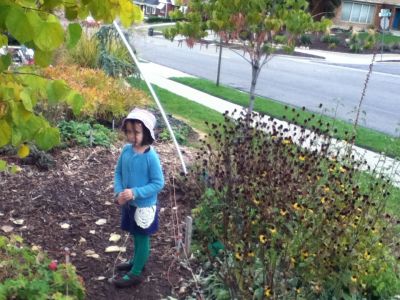The Sensitive Periods of the Child

The Montessori philosophy was developed by Dr. Maria Montessori through careful and thorough observation of the child. Having studied to become a medical doctor, much of her theory was developed based on the biological growth of the child. In developing her theory, Montessori discovered that children go through sensitive periods in their development. What is a sensitive period? It could be defined as a special sensitivity related to certain elements in the environment towards which the organism is directed with an irresistible impulse and a well-defined activity. In other words, and in relation to our children, sensitive periods are periods of time in which children are directed by an inner pull towards a certain activity, impulse, or characteristic.
Montessori herself described sensitive periods stating, “Children pass through definite periods in which they reveal psychic aptitudes and possibilities which afterwards disappear. That is why, at particular epochs of their life, they reveal an intense and extraordinary interest in certain objects and exercises, which one might look for in vain at a later age. During such a period the child is endowed with a special sensibility which urges him to focus his attention on certain aspects of his environment to the exclusion of others. Such attention is not the result of mere curiosity; it is more like a burning passion. A keen emotion first rises from the depths of the unconscious, and sets in motion a marvelous creative activity in contact with the outside world, thus building up consciousness.” Maria Montessori, Her Life and Work, pp. 120.
This means that we have a great responsibility to provide our children with an environment in which their inner urges can be satisfied in the development of their physical, mental, emotional, and spiritual well-being. Montessori described missed sensitive periods as dropped stitches. Once a sensitive period has passed, it will never return with the same intensity and completeness that it once existed. In each period, the child is endowed with special powers to direct and guide the learning process to its greatest potential. Montessori describes the child’s development of language as “one of the most wonderful.” Between the ages of 0 and 6, a child is in a sensitive period to develop language. A child learns to speak and communicate simply by being in an environment rich with language. One of the main goals of our Toddler and Early Childhood programs here at MCS is the development of appropriate language communication. Our Dual-Language programs are based on research indicating the importance of exposure to a second language before the age of 6 is most effective.
Of course, language is not the only sensitive period through which our children pass. Order, small objects, refinement of senses, learning good manners are just a few others. Some sensitive periods manifest one way in one child and quite differently in another. We might see a child developing their sense of order by building blocks or laying objects in neat rows. Another child in the same sensitive period might insist on a specific bedtime or morning routine. Yet, another child developing order might choose the same puzzle over and over again.
It is important to note that sensitive periods often pass as quickly as they come. Therefore, the importance of a well prepared environment speaks volumes for the child’s devel0pment. Along with a prepared environment, we must consciously observe our children and place in their paths the appropriate opportunities for growth. Each of our programs is built on the stages of growth that our students will experience and our specific activities placed on the shelves are a result of careful observation of the needs of our developing students. The Montessori curriculum supports sensitive periods at each level. For example, children aged 6-9 years old are in a sensitive period for development of social skills and appropriate communication. Therefore, if you walk into one of our Lower Elementary classrooms you will find many students working in pairs or small groups as they collaborate on projects within their learning environment. Of course, this is just one example of how our Montessori environment supports the sensitive periods of the students.